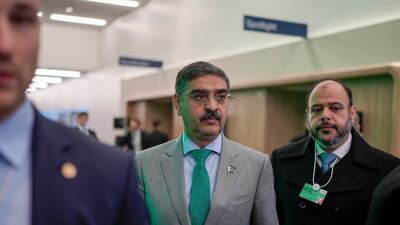Pakistan's cabinet has decided to end a stand-off with Iran in which the two countries exchanged missile and drone strikes this week aimed at what each said were militant targets, a senior official told The National.
The cabinet, headed by Pakistan's caretaker prime minister, also endorsed a move to re-establish full diplomatic relations with Iran, during a cabinet meeting.
"The cabinet gave the nod to restore diplomatic relations with Iran" said the official, who attended the cabinet meeting.
A National Security Meeting chaired by Pakistan's caretaker prime minister Anwar ul-Haq to discuss border management during a stand-off with Iran, took place in Islamabad on Friday, an official told The National.
The meeting was attended by officials from the army and the country's intelligence agencies as well as Pakistan's ambassador to Iran, Mudassir Ali Tipu and ministers, the source confirmed.
Mr Ul-Haq summoned a meeting of top civilian and military leaders on Friday for a national security review, after Islamabad's retaliatory strikes on separatist militants in Iran on Thursday, two days after Tehran sent shock waves through the region with a missile strike against what it described as hardline Sunni Muslim militants in south-west Pakistan.
Qaiser Jamal, a former member of Pakistan’s National Assembly from The Pakistan Tehreek-e-Insaf (PTI), told The National that both countries "should stop any further strikes now. Iran made a mistake and Pakistan replied to that”.
Adding that had Iran admitted its strikes were a mistake, Pakistan would have taken up the issue diplomatically, instead of conducting air strikes in Iran.
“However, because Iran declared that it intentionally struck Pakistani areas, Pakistan’s response was also justified.”
Mr Jamal, however, reiterated the need to hold the elections on time. “Our country needs a government that can decide on long-term policies, which would improve the business sector and also launch long-term schemes in other sectors. This is why elections should not be delayed,” he added.
Abdul Hameed, a Levies official (a tribal policing force) in the area of Koh-e-Sabz, where the Iranian missiles landed, told The National that the border point close to Koh-e-Sabz area remains open.
“Today, border activities remained low from the Iran side because Friday is a weekly public holiday in Iran, just like Sunday is a weekend in Pakistan. However, goods are being transported across the border as per routine and both customs authorities and Iranian diesel dealers are working as per routine despite the recent strikes,” he said.
Mr Hameed said that no militants were present in the area, as claimed by Iran.
“Law and order is also under control and the situation is completely normal in the border area,” he said.
Pakistan's caretaker foreign minister, Jalil Abbas Jilani, urged closer co-operation on security issues in a call with his Iranian counterpart, Hossein Amir-Abdollahian, on Friday and expressed his country's readiness to work with Iran on all issues, Pakistan's foreign ministry said.
Iran said on Friday said it had successfully carried out an air defence drill using drones designed to intercept hostile targets in an area stretching from its south-western to south-eastern coasts.
“Iranian forces have successfully launched a new air defence method that uses drones to intercept and target hostile targets,” state-run Press TV quoted an Iranian army spokesman as saying.
The two-day drills, which began on Thursday, cover an area from Abadan in south-western Khuzestan province to Chahbahar in south-eastern Sistan and Baluchestan province that borders Pakistan and Afghanistan, Reuters reported.
Tuesday's strike was one of Iran's toughest cross-border assaults on the militant Jaish Al Adl group in Pakistan, which Tehran says has links to ISIS.
Many of the group's members previously belonged to a now-defunct militant group known as Jundallah, which pledged allegiance to ISIS.
Instability concerns
The attack deepened concern about instability in the Middle East, where tension has been high since the Israel-Gaza war erupted in October.
Iran-allied militias from Yemen to Lebanon have launched strikes on US and Israeli targets, including on Red Sea shipping, in sympathy with Palestinians in Gaza.
The strikes also came a day after Iran launched attacks in Iraq and Syria, which it said were intended to take out Israeli espionage and ISIS operations, respectively.
Pakistan recalled its ambassador from Iran in protest after Tuesday's attack.
For its part, Tehran strongly condemned Pakistan's strikes on Thursday, saying civilians were killed, and summoned Pakistan's most senior diplomat in Iran to explain.
Meanwhile, Russia called for restraint and diplomacy on Friday.
Kremlin spokesman Dmitry Peskov said the escalation was cause for concern and was partly a consequence of the Gaza crisis, Reuters reported.
Asked about the situation between Iran and Pakistan, he said Russia was maintaining contact with both sides through diplomatic channels.

